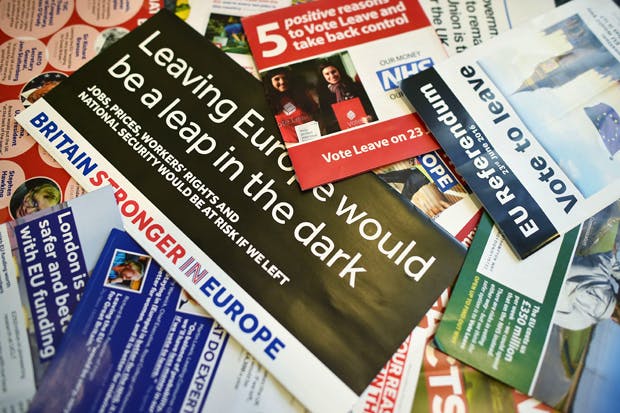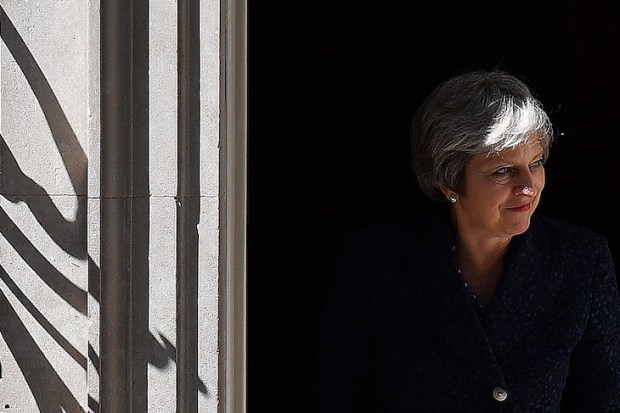Complaining about the EU referendum campaign has become an integral part of the referendum; even Delia Smith has got in on the act. But politicians on both sides who pretend that the choice is simple, despite having agonised over it themselves for years, are only partly to blame for the dire state of the debate. The bigger problem is that the referendum is taking place at the wrong time.
It was meant to take place once the eurozone had decided how to address its own problems. The British public could then decide whether they wanted to remain in or leave the European Union armed with this knowledge. But the question is still unresolved. The absence of an EU treaty setting out what the eurozone will do next not only weakened David Cameron’s negotiating hand, it also means that voters will take a leap in the dark whichever box they tick.
There are three options for what might happen to the eurozone. The first, and least probable, is that it will break up into separate currencies. One Remain-supporting cabinet minister argues that this is likely to happen within the next 20 years, and that this would be the right moment for Britain to leave the EU. Now there might be some logic to that argument — the eurozone is a fundamentally imperfect currency union. But it would be a mistake to under-estimate the political will on the Continent to keep alive both the currency and the dream that it represents.
Then there is the possibility of full-blown eurozone integration. This would involve fiscal transfers between eurozone states and a eurozone budget. The British government has frequently sounded sympathetic to this approach, and in the renegotiation gave up its right to veto such moves. But this would create problems for Britain. Eurozone states would, inevitably, start to caucus together and vote the same way. So Britain would face an increasing number of defeats under qualified majority voting. The main focus of the EU would shift from the single market to the single currency area, again to Britain’s detriment. Staying in this kind of EU would be a deeply unattractive option for the UK.
But there is probably neither the political will nor confidence to proceed with such a move in the near future. The most likely scenario is that the eurozone will continue to muddle through. This too will have an impact on the UK. First, it will mean that Britain is in a trade union which is steadily losing its share in the world economy. Continued economic troubles inside the zone will also make it unlikely that the EU can strike many significant new trade agreements in the decades ahead as protectionist sentiment continues to rise. Another consequence of eurozone sclerosis is that the UK will continue to act as Europe’s employer of last resort, accepting more and more immigrants from the eurozone.
The overwhelming majority coming here will be highly motivated; many will be skilled. But the fundamental problem will be that our government cannot control the process. It won’t be possible to admit only those EU immigrants who have skills that we need. Nor will it be possible to limit the numbers coming so that our infrastructure and public services can keep up.
The merits of the Australian-style points system that Boris Johnson and Michael Gove have been arguing for this week is that it would let the government match immigration to skills gaps in the economy, would not discriminate between nationalities and, by keeping the process orderly, ensure that public support for immigration could be maintained in the long run. One would hope that this system would also help reverse the decline in the number of students coming to the UK for long-term study, which is now at its lowest level since 2007.
High levels of immigration are a by-product of EU enlargement, not just the result of problems in the eurozone. Bringing more countries into the fold has long been a goal of British foreign policy. It was thought that the larger the EU became, the harder it would be to deepen integration. But this strategic gamble has failed: enlargement has not brought an end to the political aspects of the European project.
Set against all this is the seeming inevitability that coming out would involve short-term economic disruption. There would be a period of uncertainty before our new arrangements with the EU could be confirmed. The UK could try to minimise this by not invoking Article 50, the two-year procedure for leaving the union, until the outlines of a deal became clear. But it would be wrong to imagine that the Brexit process could be made totally smooth. After all, many EU countries would not want to make leaving the union appear an attractive prospect.
Worries about this short-term disruption understandably play a large part in public opinion. An Ipsos MORI poll a few weeks ago had the Remain camp ahead by 18 points despite the fact that most respondents thought that Brexit would leave them no worse off in ten years’ time, although they did believe they would take a hit in the first five years.
But a decision such as this cannot be made on purely short-term grounds. As Edmund Burke said, ‘society is… a partnership not only between those who are living, but between those who are living, those who are dead, and those who are to be born’.
Whether Britain could make a success of life outside the EU would depend heavily on the policy choices this country made after leaving. But there is no option in this referendum that comes without risk. Indeed, perhaps the most significant danger comes from continuing to stoke anti–politics sentiment by remaining in a system over which British voters have no control.
Got something to add? Join the discussion and comment below.
Get 10 issues for just $10
Subscribe to The Spectator Australia today for the next 10 magazine issues, plus full online access, for just $10.















Comments
Don't miss out
Join the conversation with other Spectator Australia readers. Subscribe to leave a comment.
SUBSCRIBEAlready a subscriber? Log in